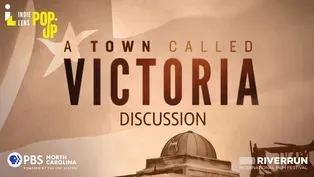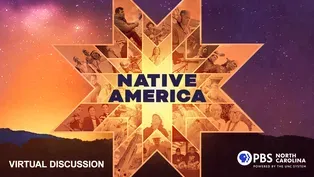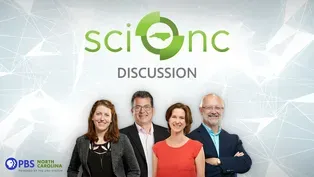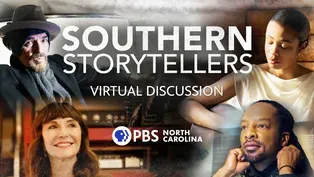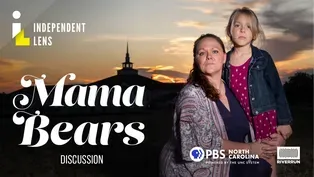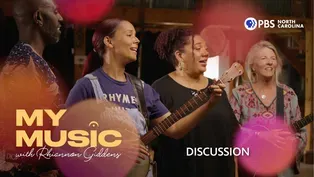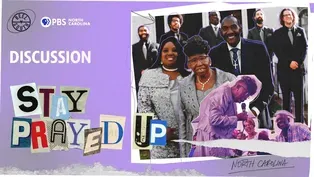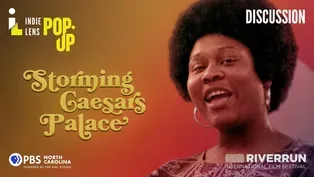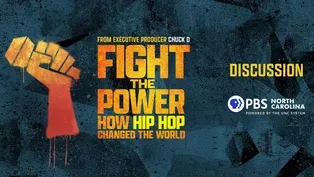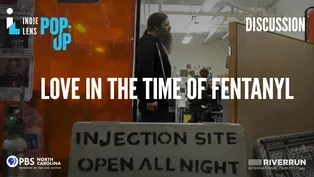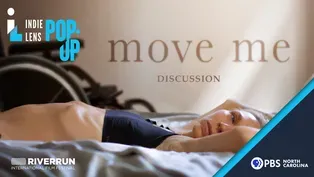PBS North Carolina Specials
Discussion | Mysteries of Mental Illness
6/17/2021 | 1h 3m 54sVideo has Closed Captions
Local mental health professionals and policy makers discuss health care options and more.
PBS NC Associate Producer of National Productions Josh Clinard sits down with Chief Deputy Secretary of Health, NCDHHS, Kody Kinsley, Ashish George, NAMI NC and Malaika Edward, CERCC, NSCU, to discuss COVID-19’s effect on mental health, current laws and policies, cultural and economic barriers to mental health care and low-cost treatment options.
PBS North Carolina Specials
Discussion | Mysteries of Mental Illness
6/17/2021 | 1h 3m 54sVideo has Closed Captions
PBS NC Associate Producer of National Productions Josh Clinard sits down with Chief Deputy Secretary of Health, NCDHHS, Kody Kinsley, Ashish George, NAMI NC and Malaika Edward, CERCC, NSCU, to discuss COVID-19’s effect on mental health, current laws and policies, cultural and economic barriers to mental health care and low-cost treatment options.
How to Watch PBS North Carolina Specials
PBS North Carolina Specials is available to stream on pbs.org and the free PBS App, available on iPhone, Apple TV, Android TV, Android smartphones, Amazon Fire TV, Amazon Fire Tablet, Roku, Samsung Smart TV, and Vizio.
Providing Support for PBS.org
Learn Moreabout PBS online sponsorshipMore from This Collection
Discussion - A Town Called Victoria - Independent Lens
Video has Closed Captions
The filmmaker and former Victoria residents share their story. (46m 51s)
Discussion - Native America Season 2
Video has Closed Captions
Panelists discuss preserving the languages of Native American tribes. (39m 1s)
Video has Closed Captions
Sci NC executive producer and host, Frank Graff, chats about upcoming Season 6 of Sci NC. (26m 6s)
Discussion - Southern Storytellers
Video has Closed Captions
Author David Joy and others discuss storytelling and their new PBS series. (42m 13s)
Discussion - Mama Bears | Independent Lens
Video has Closed Captions
Producer and director Daresha Kyi discusses the film and LGBTQIA+ advocacy. (34m 41s)
Discussion - My Music with Rhiannon Giddens
Video has Closed Captions
Discussing the series with producers Will & Deni McIntyre and country artist Rissi Palmer. (39m 56s)
Discussion - Free Chol Soo Lee | Independent Lens
Video has Closed Captions
Local lawyers, professors and nonprofit leaders discuss wrongful convictions and reentry. (40m 44s)
Discussion - Stay Prayed Up, Reel South
Video has Closed Captions
The filmmakers discuss their journey with Mother Perry and The Branchettes. (45m 4s)
Discussion - Storming Caesars Palace | Independent Lens
Video has Closed Captions
Local professors and nonprofit leaders discuss welfare and the social safety net. (33m 2s)
Discussion - Fight the Power: How Hip Hop Changed the World
Video has Closed Captions
Local experts discuss the history of hip hop with PBS North Carolina. (59m 43s)
Discussion - Love in the Time of Fentanyl | Independent Lens
Video has Closed Captions
Local harm reductionists, therapists and others discuss the opioid crisis and more. (55m 44s)
Discussion | Independent Lens: Move Me
Video has Closed Captions
A dancer with blindness and disability advocates discuss adaptable arts programs. (38m 46s)
Providing Support for PBS.org
Learn Moreabout PBS online sponsorship- Good evening, everyone.
Welcome to this special mental illness focused virtual event.
I'm Josh Clinard.
I'm an associate producer on our national productions team here at PBS North Carolina.
We're really excited for this new four-part PBS docu-series called Mysteries of Mental Illness.
You just saw the first episode of it tonight.
It's a really amazing thorough examination of the history of the stigma that surround mental illness and it also sheds light on why there's still so much stigma and confusion about mental illness today.
Tonight, we will be discussing this and looking at work being done in North Carolina to educate and provide mental health resources to all regardless of background, race, socioeconomic standing, et cetera.
We have a really great panel of experts and leaders in North Carolina.
So please start entering your questions into the chat feature here, over here, somewhere.
So here we go.
Please allow me to introduce you to our panel of distinguished guests.
First off, we have Kody Kinsley.
He is the chief deputy secretary of the North Carolina department of health and human services.
We have Ashish George.
He is the director of public policy and a psychiatric advanced directive specialist at NAMI, North Carolina, NAMI, which stands for the national Alliance on mental illness.
We have Malaika Edwards, and she is a doctoral student at North Carolina state university, and she is the center coordinator for their community counseling education and research center.
Thank you all for being here with us.
You all have very lengthy bio's of an incredible work that each of you are doing in the field.
So I'll let everyone Google that, check out their work.
I'm also a big fan of Kody's Twitter.
So check that out.
But for the sake of time, let's jump right into the conversation.
So Kody, I'll start with you.
So, for far too long our health care system has separated the body thinking of it kind of as two different things.
So from the mind and body.
So, and I think that's resulted in deemphasizing and underfunding and stigmatizing care and treatment for those with mental health needs.
So from your position as chief deputy secretary at DHHS, how do we go about addressing needs as one instead of two separate things?
- Josh, it's a great question and it's incredibly important.
When you have to go into one door to take care of your body and one door to take care of your mind, it's stand to reason for anyone that we're segmenting them out.
And then when one door seems to be underfunded or slightly smaller than the others, or not talked about among your family, then it also starts to feel like it's pretty full of stigma.
So, there's things that we're doing at the state level and there's also things that we need to see more of at the community level to try to help bring those together and to not be carving the mind out of the body for a little bit of a gruesome example with some of that mystery.
At the state level, first and foremost, we need to think about how our insurance works differently.
With Medicaid transformation, which is one thing we've been doing for our public payer system.
We need to get payers that are focused on both behavioral and physical services as opposed to having separate plans do that.
And that transformation has been planned and coming for some time and now we're excited because we're just a few weeks away from the first steps in that direction.
And we've seen in response to COVID-19 over the last several months, 18 months our private payers and employer sponsored plans, stepping up and providing more robust benefits, more access points, more providers and network, all those things to make sure that behavioral health services are more real and readily available.
Mental health parity was a big conversation point well over a decade ago and I think we still have to push forward to achieve that.
I need to be able to achieve behavioral health services just as easily as physical health services.
And at the community level, at the individual level, this also means our primary care Docs providing more robust behavioral health services as well, doing physical health, or behavioral health services integrations into their practices and having the support to do that and of course the funding to do that, the payers as well.
So there's lots more that we can do to continue to make sure that folks get access.
But the basic premise is this.
One in five people will have some sort of mental health issue in a given year.
That number is going to be impacted by what we've gone through this last year.
Behavioral health is not a specialty service.
It is not something offered the distance in the rare few.
It's something for all of us at any given moment, and we need to have that kind of access to it.
- That's great.
I really love that.
I mean, I think it's the example of, if I break my arm, I'm gonna go see a doctor for that, but if I have a break in my mind, it's less likely that I'm gonna see that.
So I love that there's work being done to make that more accessible.
Ashish, so looking at the mental illness side of that.
So I think there's a correlation sometimes between mental illness and non-conformity, I'd love for you to speak about that and looking at too, so are there people that are struggling with severe mental illness because of or that's fueled by rejection and alienation due to circumstances that are often beyond their control?
- Yeah, I definitely think so.
A famous example that was mentioned in the documentary, I mean, in the screening, it was homosexuality, like until the seventies I think the DSM five, which is used to diagnose people included homosexuality as a mental condition, can be treated.
And if you grew up generations ago, how would you respond to being told that you were someone who needed to be cured?
And even in some parts of America now, I mean, there are communities where you would grow up and be told that there was something wrong with you.
You need to be cured if you are experiencing same-sex attraction.
So when we think of what mental illness is, it is often what makes us uncomfortable, again, hearkening back to what we just watched.
And it's a face that we can't seem to see beyond.
So if we can't see beyond how someone looks or how someone behaves, or how someone loves, it can be very disorienting for some of us, and we're getting better at that.
Thank goodness.
So for example, 10 years ago, trans activists were largely put on the sidelines to the point where it wasn't uncommon to hear jokes at their expense on TV.
I remember on the daily show, Jon Stewart made a very crude and vulgar joke about trans people.
You can find it on YouTube.
I'm not gonna repeat it here, of course, but I'm sure he would be embarrassed by that joke now.
And the reason we stigmatized, especially the older generation stigmatized people like sexual non-conforming minorities, gender non binary people, even women who have issues like postpartum depression.
Think about it in the seventies if you were a woman and you had a kid and you were nursing an infant, and you were just deeply depressed, people would tell you what's wrong with you.
They would say like, this should be the happiest time in your life.
What's going on in your head, like something's wrong.
And now we understand that that's a very normal physiological and mental health response.
We always set a standard and people who fall short of that often pay a price, whether it's black or brown children in schools who are disciplined at higher rates, whether it's, like I said, non-conforming minorities, whether it's people who just don't fit into the 9 to 5 job or who lack community resources and very reasonably or understandably at least display reactions to that and don't hide the fact that they feel rejected.
All of that is a reminder that there's a societal failure going on.
It's not just an individual failure.
It's not even an individual failure at all in a lot of cases, right?
Like the ones I've been mentioning.
So we need to be careful about that and be modest I think when we diagnose people.
Of course, there are real conditions where people are in danger and where people need real help because of chemical issues or hallucinations or things like that.
But we also need to remember that sometimes we need to ask ourselves, like, are we providing a society where people can actually flourish?
- Yeah.
I love that.
And I think what's interesting there is that a lot of those people along with that trauma starts to continue and kind of builds and goes forth from that, which is perfect because Malaika, that's something that you focus on and you've been researching.
So I'm curious, looking at trauma, especially trauma that comes from racism, sexism and all the other isms.
Can you talk a little bit about trauma and the impact it has on individuals based on those factors?
- Yes.
Thank you very much.
So one of the things that I think is first important is explaining exactly what trauma means.
So, and the difference between saying that someone is having a traumatic response to something and then the diagnostic category of post-traumatic stress disorder or any one of the other trauma diagnoses.
So, first of all, I'm most familiar with the American psychological association definition for trauma.
And in part, it's basically a response to a terrible event.
It's an emotional response to something that was terrible, distressing, that overwhelms a person's ability to cope.
And we all go through that.
One of the things about my work, I'm a licensed clinical mental health counselor and I operate from a trauma informed perspective.
And so that means that I make the assumption that we have all experienced trauma in some way.
Now, I wanna separate the experience of a traumatic event.
Something that's distressing, that is potentially overwhelming to someone's abilities to cope emotionally with the diagnostic categories that are included in the DSM, which is the handbook or the manual that has the criteria for all of these different mental illnesses and diagnoses that we've been talking about.
So for instance, post-traumatic stress disorder, it does involve exposure to actual or threatened death or serious injury or violence of some sort, but then there are criteria that needs to be met so a person gets that actual diagnosis.
And so I wanna be clear that there is a separation between trauma itself and a diagnosis of PTSD or some other form of trauma.
So let me start there.
The next thing is being trauma informed.
So as a clinician I wanna say that I operate from the perspective that everyone has experienced something distressing, something that's potentially traumatic.
I mean, and that's everyone in society.
So, when I start there as a clinician, you begin to unpack with the person in the room all of the different things that have occurred.
So we were just talking, we just heard, and we heard in the documentary and the screening, and then we just heard about different identity statuses.
So racial identity, ethnic identity, cultural identity, sexual identity, gender identity, socioeconomic status, all of these different things that comprise the individual.
And if you do not conform to certain aspects of the culture in which we live, then you might experience some sort of racism or discrimination of some sort, any one of the isms.
So heterosexism for instance.
And so, I mean, there are people that because of who they love might feel that they might live in a community where they might be threatened with death.
There are people that have died because of that.
And witnessing that, experiencing that, if you've heard about it, those things are traumatic and they impact how you then move forward in the world.
What you're willing to share, what you're not willing to share, what you think is safe and what is not safe.
The other thing I wanted to mention before I turn it back over is, and this is related to some things the other panelists were talking about.
I think that a significant component of stigma and some of the other things we're talking about has to do with implicit bias.
So this notion that we all, I mean, everyone, everyone has biases.
You're aware of some of them and some of them you're not.
And they impact how you interact with other people, the judgments that you make about them and that's not... And healthcare systems, mental health, they're not immune to that.
And so one of the things that clinicians, and that's medical doctors all the way to counselors and other types of other types of practitioners need to be aware of is they need to have their own self-awareness.
What are my biases?
What are my own experiences that might impact how I judge this person and the diagnoses that I make, or the way that I interact with this person, and when people are not aware of their own biases.
And if I'm a patient or a, a client or something like that I might be impacted by their bias and that makes me reluctant to come back for service in addition to other issues that have to do with accessibility, which we may talk about later.
But I think that answers the question, but if not, let me know.
- Yeah, no, I love that.
And I definitely do wanna come back to this because I feel like looking at 2020 really brought mental illness to the forefront of everything.
And I think in this sense, a lot of it was looking at racial injustice and reckonings brought a lot of that to the forefront, but also there was the COVID side.
So I do wanna jump into that part real quickly and come back to that.
So, Kody, I know you served as the operations lead for the states COVID-19 response.
So I'm curious, what have you learned from the pandemic that can help us address our behavioral health needs?
- Well, I want to first, I think pile on to what's been said in saying that the disparities of access and mental health services, the implicit bias that plays out both when services are being provided, culturally competent care, so that folks may want to go to someone with a similar lived experience, that has been amplified in the course of COVID-19.
And we've seen it play out across our healthcare system, not just our behavioral health care system.
We've seen that the tip of the spear of COVID impact people of color, particularly in North Carolina, black African-American individuals it's [indistinct] Latinx individuals with higher death rates and increased case rates.
And we'd had to be really intentional in our response to COVID-19 to make sure that our response was proportional to that disproportionate impacts.
It's such that we were over-testing and over providing access to services and making sure we're bringing vaccine into those spaces at a disproportionately large rate.
But I think that all plays out again.
I think this emphasizes the importance of not necessarily carving the mind out of the body, right?
Failed healthcare system aspects for our behavioral health system are really mirrored on the physical healthcare side as well.
So really equity at the center of our response has been really critical for COVID-19 as we think about behavioral health overall.
Some key things on the data however that we've seen quickly was, we saw a tripling in the early days of COVID-19, kind of think of these different phases of the pandemic where there was a lot of uncertainty and people weren't sure what to do.
And I loved it that screening would the showcase the impact of COVID-19 on folks with certain behavioral illnesses that may exacerbate what's going on or how they're experiencing it.
We saw a tripling in the number of people saying that they were reporting anxiety or stress at the time.
It was up to one and three from one and nine in a given period of time.
That's a really large increase, and if you're already at a certain place on this spectrum of wellness, that's gonna move you depending on your own ability to cope, your supports around you, access to healthcare professionals, et cetera.
And so where we were focused was trying to make sure we were giving people the necessary supports to try to help cope effectively to stay on the wellness end of the spectrum.
The last thing I'll say is I think trust really is foundational in all this.
I think we saw that in our COVID-19 response and what we're gonna have to learn from this going forward.
COVID-19 did not necessarily show us any new problems.
A lot of these core foundational issues in our behavioral health system or health care system overall have long been there.
These are disparities and injustices, history of many pacets in our country that are foundational.
And I can't teeth upon us.
Can't miss the moment to point out that that legacy is still with us in many ways and it's been institutionalized into systems that we have to continue to fight against.
And COVID-19 really just took a spotlight, put it clearly on those problems we have to continue to push forward to really achieve a real sense of recovery.
- Yeah.
And I think too that something that really led to a lot of depression and anxiety was loneliness and isolation.
COVID-19 brought the term social distancing into our vocabulary, which I had never really thought of.
Ashish, I think that's something you'd mentioned wanting to cover.
So how do you think the pandemic has changed our attitude toward loneliness and which often creates a lot of those mental illnesses or exacerbates them?
- Yeah.
So I think that, you know, studies consistently show that our brains just work better, our immune systems work better.
We are more of ourselves.
We're self-actualized to use the psych 101 term to a greater extent when we are connected to other people.
And part of it is just chemical, of course.
Our brain produces oxytocin when we bond with people.
And part of it is just a feeling that we belong in the society and even at a more micro level in our neighborhood, in our house, in our apartment building.
And I think that one out of every four Americans, something like that, the last I saw was one out of every four, says they don't have a single confidant in the world.
No one to share their problems with, no one to spill their guts to when they're really going through something tough.
And that's scary, right?
That's attacks on our society because it would be the same as if we took one out of every four people and only allowed them to go outside two out of or three out of every five days of the workweek, right?
Like people are diminished by this in understandable ways.
And the solution is complicated.
I mean, I think that therapy is part of it, but I think that we need comprehensive change in our society like Cody was saying earlier.
COVID has not brought out anything that wasn't already there.
And to a great extent, the way we live is predicated on how we get around, the lack of transportation, the lack of education, being overworked in many cases.
So my job at NAMI, North Carolina is not focused on reforming society in all those ways.
I focus on mental health policy, more narrowly and we make important progress.
But I think it's also important to remember that a healthy society requires healthy institutions, healthy communities.
And that requires big picture thinking, radical thinking sometimes.
And that's something that I was encouraged by last year seeing people express such solidarity.
Even under very difficult circumstances when COVID was raging, people hit the streets on behalf of one another.
And I thought that was great.
And I think that we need to imagine what it's like to be someone radically different from us and what it's like to be without love, without friendship, without community, without the ability to construct a future, which is often a colloquial description of depression you hear.
It's the inability to construct a future.
And when you're alone, time moves very slowly, ironically enough, but you have a hard time imagining the future.
It's a real not contradiction exactly, but there's a tension between those two things that can be quite excruciating.
And so I think that in a state as diverse as ours in every way, racially, geographically, socioeconomically, we can be a laboratory for making things better.
We're not Vermont, right?
We're not Maine, we're not sparsely populated and relatively homogenous.
Other states can look to us.
And so that puts a burden on us, but it also gives us an opportunity to show the way to a better future.
And we've done it before, North Carolina has done it before.
Look at our good universities, look at how we developed a reputation for being relatively good on civil rights during the civil rights era.
When other states had very spectacular showdowns between federal and state forces over integration.
Of course there was plenty of tension North Carolina, but because of governors like Terry Sanford, things went more smoothly than they otherwise might have.
And so we shouldn't wait for another Terry Sanford.
We need to implement progress by taking action ourselves.
- Yeah.
- Can I Josh, can I just jump in real quick?
I wanted to [indistinct] everything that was said and I think it is important because we often approach COVID-19 in these last 18 months as this like big dark spot on folks' lives.
And I think that's the real things that we need to be considering and I agree with everything that's been said, but I do think that is also important that there were a lot of folks found meaningful and they found defining themselves in some way, either how they responded to this.
They found purpose, the solidarity.
And I think that we have to, part of the recovery process, kind of as a community is also talking about just how all the dynamism here that's playing out and the fullness of the response.
But I think that's really important.
- Yeah.
And I love too I think a lot of the things that we keep coming back to is these minority groups.
And I'm curious from Ashish and Malaika, I feel like both come and look at look at this, but do you think that members of minority and immigrant communities are receiving a mental health they can get and deserve?
How can they find these, what obstacles are they facing and what can be done in that space?
- Thank you.
I appreciate that question.
I want to say a little bit about some things I heard earlier.
So let me start there.
One of the things I think is really, really important.
I heard Ashish mention it and I apologize because I think I mispronounced your name.
And also Cody, you talked about statistics.
So I think one in four people, you mentioned one in four people will experience a mental health diagnosis or might meet criteria for a mental health diagnosis in this year.
One in five people will...
I can't remember.
There was another statistic that you mentioned that was a one in five, but one of the things that makes me think about is something that you were talking about earlier.
It's the culture we live in, like to me, and I mentioned this to Josh earlier in an earlier conversation.
If one in four people, that's a quarter of the population.
If one in four people experience a mental health condition, or a diagnosis or meet criteria, and they interact with one other person, then that means half of the population has some sort of experience with it.
They're impacted by it in some way, whether they have a diagnosis of it or not.
I mean, those numbers grows exponentially, right?
The more people that you interact with, we're at work, we're on zoom now, or doing whatever we're doing.
And so we're seeing...
I think about how many people are actually impacted by it, whether you have a diagnosis or not.
And so I asked myself, what about our culture is going on where that many people have something that we're calling an illness?
I mean, the CDC would shut a city down if those statistics happen for something like cancer, right?
If a city had 50% of the people had cancer in that city or 25%, they would go there and try to see what was going on.
I mean, it would be a call to arms.
And I think it's just, there's a lot of, and we saw in the documentary, there's a lot of questions and there's still a lot of unanswered areas in mental health.
And so, it's just not viewed the same as some other areas in medicine.
That said, when you look at communities of people that are historically marginalized, and I'm gonna say this because I've heard the term minority you used.
I don't actually use that term.
I think that it's...
Especially when we're talking about marginalized populations.
So I generally say it that way.
People that have been historically marginalized, or some other way or minoritized, which is more of a, you know, it's using it as a verb.
But I think that when you're looking at both populations, I do not think that people are getting the treatment that they need.
I mean, this is broadly speaking, of course, but I think that more can be done.
I think that there are a lot of issues with accessing services and that has to do with structural barriers.
I mean, things that are...
I think Ashish mentioned transportation, that's an issue.
If you live in an area where there's not a bus or socioeconomic status, you don't have the money for a bus, or I think Kody talked about insurance.
There are people that don't have insurance.
And so what do you do if your job doesn't provide insurance to you, or if you do have insurance and it costs you $75 or $100 every time you wanna go, that would be $400 a month if you went every week to see a counselor or some sort of clinician.
And that's not reasonable for the majority of the population in the country.
And that is another cultural issue that has to do with the way that... That's an economic issue, quite frankly.
And I lump that into culture as well without getting into the politics of it.
Although all of this is political.
So I think I'll stop there and turn it over.
- I'll add something too.
So NAMI, North Carolina had our big ad policy event, advocacy day, which I organized where we had legislators, people affected by mental health issues.
And NAMI's staff address an audience to talk about advocating for our priorities in this calendar year.
And one of our priorities was rural mental health, another was funding early intervention programs for young people, especially in disadvantaged areas.
And the second topic, of course was mentioned in passing, I think during the screening.
And when we talk about mental health access, 63 out of a hundred North Carolina counties don't have a mental health practitioner, which is an astonishing statistic.
When you think about how good the education system, especially at the higher education level is in North Carolina, we have UNC and Duke and Wake forest and Davidson and yet only 63 out of 100, when psychology is one of the most popular majors in America, how does that happen, right?
And so I think that a lot of people end up going without access to care because there is no access to care.
Care is a bridge that someone blew up.
And oftentimes deliberately, oftentimes, like Kody was saying, there were policy choices that were made that were not targeting minority, I won't use the word minority, that weren't targeting African-American or Latino or poor, let's not forget them, poor communities because they didn't have clout and the people wanted the money to go elsewhere.
So, we expect a lot of people in America.
We expect people to be being pulled up by their own bootstraps all the time.
And that's a very destructive idea because it tells people that if you fail in any way, it's your own fault.
It's a victim blaming mentality.
And the me too movement has told us, that's completely wrong when it comes to women.
Correctly it has told us that a woman sexual assault is not the fault of her short skirt and a person's mental health condition is not the fault of where they live or how they grew up or where they went to school.
And yet we still judge people for mental health outcomes all the time based on these conditions and then we we stigmatize them.
And who did that, right?
Like we did that as a society.
We're all kind of complicit and we can do better.
I grew up in Guilford county, I went to college in Mecklenburg county, and now I live in Wake county where I work.
So, I've spent my time in North Carolina in counties full of the best institutions, right?
The best schools, the best hospitals, but there are people in 97 other counties who are really going without things.
And we owe them a lot, not just because of historical injustices, but also just because they're human beings and every human being has dignity and value.
- Can I just say one thing real quick?
Sorry.
I love everything being said.
One thing that we really haven't touched on, which I think is really important is that we actually have a whole lot of mental health institutions in every single county in North Carolina and they're the jails.
It is tragic that the first frontier of the vast majority of mental health and substance use disorder services all across the country, but also in North Carolina are jails.
70% of people in jail have a substance use disorder.
Many of them have a co-occurring mental illness.
And to Malaika's point, we need to stop talking about special programs and special efforts on the fringe because the truth is, is that it's the whole program.
It's the whole thing.
It's the whole system, right?
And everybody's connected to it and I think there's no better example than when we look at our justice system.
And as we have seen in with opioids now, which got a different conversation because it was white people in drawers instead of other people behind bars, I think that we're at a place where we need to, you know, we can't arrest ourselves out of this and we need to be heading in a different direction where treatment and diversion to treatment and every step, you know, and again it all comes back to reforming the way justice to a true sense of justice and we keep growing.
But I know I've got other questions to talk about.
- So for most audiences members, if they're like me wanting to jump up out of their chair and do action, we would love to hear what are action items that we can do to advance that whether now, or when we close.
But if you wanna jump in there, I'd love to hear this.
- Well, I mean, I think that it starts at the local community level, like North Carolina has 100 counties and 100 county commissioners, right?
And these county commissioners make really important choices about investments.
And I remember when I was living in a county in North Carolina and I won't give credit, there was a lot of discussion about how much money we were gonna invest in building the new jail, right?
And all the research shows now that building money into programs that would provide social services to folks, would have provided services around pre-arrest diversion, jail based treatment programs, capacity restoration, all kinds of other things would have been much better investments would have got, not only because it would have diverted the need for the jail, but it also would have gotten folks back into jobs and back into the economy, right?
I mean, severe mental illness, substance use disorder and poverty are co-occurring and we need to too often kind of shift there.
So I really encourage folks that act locally, right?
Think globally, act locally.
And I think in our state, there's lots of conversations about mental health.
And I think that you can focus in on the jails.
And the great news is that we're putting our money where our mouth is at the state level and putting out pilots for local communities to apply, to try to get these dollars, change the way the local systems work, and then prove the point that investments at a mass scale level would really change the way our entire state works to do those big vision things we need to do.
- I love it.
That's amazing.
Okay.
I've got to start jumping into some audience questions.
Let's see.
So, audience question.
Would it make sense for North Carolina to fund our elementary school teachers offering better resources, training and education to identify children with budding mental health issues?
Earlier intervention and treatment is critical.
Is it not?
- I think it would make sense, but I think it would also make sense to just fund therapists, professional therapist instead of asking teachers to do that job.
So teachers have enough on their plate and I think that asking them to do more could make it a little too stressful for them.
But when you have an elementary school child, age, like between five and 10, they go through the same range of emotions as almost an adult, not quite, and I think that what could really be useful is having teachers not have to take on additional responsibilities.
They are already overtaxed.
My mom is a teacher at that level.
Early intervention and treatment is critical.
Absolutely, all the evidence suggests that.
As Kody said, the first point of contact for lots of people with mental health care is the criminal justice system.
And by then, things can really spiral out of control very fast because prison is not a place to recover from anything.
And so I would recommend hiring more therapists, social workers and counselors first and foremost.
And as an auxiliary, as a complimentary measure, doing some training with teachers.
But let's not burden teachers with too much more, that'd be my two cents.
Malaika, how do you feel about that?
- Thank you.
I feel very strongly about not burdening teachers with that responsibility.
That's not their area of expertise.
There are school counselors.
There are people that are trained as school counselors.
And so, to your point, ensuring that at every elementary school or every school at every level has a school counselor in addition to the school utilizing that person for what they were trained to do.
I'm aware of many instances where school counselors are used in other ways, because the school is short-staffed or they need testing proctors and all of these different things.
And the school counselor is actually trained to observe the students and check into mental health issues and things like that.
And if the school isn't utilizing the individual in the proper way, then that's also doing a disservice and it's adding, it's putting additional burdens and pressure on the teacher in the classroom who is ultimately going to have to deal with some of that, because they're going to see some of those behaviors manifest.
So there are people that are specially trained.
It could be a social worker, but there are school counselors as well.
There are other individuals that might be placed in schools and I think it's really important to focus there and then ensure that they are being utilized appropriately.
- The school counselor to student ratio in North Carolina is one counselor to 353 students.
- And that's average because I know that in some places it's off the charts.
- It's essentially, yeah, there's no counselors in many places.
I absolutely agree.
I do think that there's more work we can do around trauma informed schools, right?
I think it goes back to disciplinary points that were made earlier as far as if someone is thinking about the social determinants of health, if someone is hungry, they can't focus in class, they're acting out and they get detention.
And if they're often a person of color, they end up suspended faster than someone else.
I think that we have to implement trauma-informed principles in those spaces and in our communities, and in response to this disaster now more important than ever.
So I do think there are things we can do, but I will be the first to agree that our teachers are overboard and needed to be paid more and need to have more time.
- Okay.
A similar question that has a lot of overlapping things, we've got to have these.
Any progress or steps being taken to set a mental health professional on all police calls, especially when it is possible, I mean, when it's possibly a mentally ill person.
- So I'll just say a handful of communities in North Carolina have instituted some of these efforts, right?
The first thing that many counties have done is put their officers through crisis intervention training.
But one thing that we're growing is doing crisis intervention training are 911 dispatchers, because part of this recognition, right?
There's this balance where in North Carolina, we want crisis to be able to have no wrong door approach, right?
And right now we have too many crisis numbers and it's a different conversation, but we wanna get folks to divert to the right process.
So we're working on that.
And I think there is definitely more to do.
I'm really intrigued by models like the cahoots model, which has done in Oregon where they have more folks go out on call.
It's just a matter of being able to get those sorting mechanisms right on the front end and provide kind of more no wrong door options.
- Yeah.
Really important question.
I suffer from depression and my insurance doesn't cover it enough.
Are there any free or low care therapy options?
- Well, I work at community counseling education and research center.
One of the reasons why it was developed was to improve access to care.
And so I know for certain that our service provides support for individuals who may be suffering from different conditions.
It is a... Oh goodness, I'm losing it, I'm losing the term.
We have, not a co-pay, but when you...
I don't know why I'm blanking on this term, but anyway - Sliding scale.
- I'm sorry?
- Sliding scale.
- A sliding scale.
Thank you, Kody.
We have a sliding scale.
And so you may want to Google or look for services that have sliding scale options.
There are not going to be a lot, but they're out there.
And I know that we're one, and there are several that I'm aware of.
Anyway, I don't know where this individual lives, but there are several that I'm aware of in Wake county.
And so it could be some places, it's based on income.
I think in a lot of cases that's what it is, but that may not be the case.
Sometimes it's pay what you can.
And I have seen that.
You might have to do some extra research.
I'm not aware, I mean, I don't know if others are, but I'm not aware of any one space where you, you know, like one website where you go and it lists all the places everywhere in North Carolina that has low cost services, but they're out there.
And so I would look for...
I would research that on the internet, and I've done it for clients and others.
And so you can find that information.
- At the beginning of COVID, federal COVID-19 response, we stood up our hope for NC line.
I wanna encourage folks to call that number.
It's +1 855-587-3463.
And I'm sure, well, I'll tweet it out for all 12 of my followers and make sure that other people know it.
This is for us, the predecessor of what we hope to be our three digit dial 988 number for folks to call for if you're in a crisis and encourage the person asking the question to call help for NC.
We also have texting options.
You can find these things online if you prefer to text and we'll help route you through.
We have peer services available so you can talk to peers, people that are recovering themselves, we can also work to partner with some around BMCOs here in North Carolina to help support you through other methods of funding to potentially get some recovery or crisis counseling.
- Great.
We'll definitely send out an email afterwards with a lot of these resources connected.
So thanks for sharing those.
Another question.
So what if anything, let's see, what if anything is being done to better reach immigrant communities to better understand how they view and treat their own illnesses?
- So this is a really important question that I will share from a statewide.
Unfortunately, we have a North Carolina state law that excludes state dollars from being spent on individuals that are undocumented.
I realized that does not comprise all immigrant communities, but that is one community that I am particularly focused on working through, trying to serve.
We have block grant dollars from the federal government that help us serve them that we are allowed to use that, but it's very limited.
And so that is a big gap that we have because of an exclusion in serving these folks.
I think going back to Malaika's point, that people are touching everyone and these are all impacted.
And so we don't, and as as COVID-19 taught us that we're only as well as our neighbors, right?
Our neighbors ability to have paid time off and access to healthcare impacts my health.
And I think that we do need to find better ways to serve those folks.
And also it goes back to the point of making sure that we prioritize having providers that look and come from lived experiences like those communities, that are in those communities and working with them.
But I would love to hear what others on the panel think.
- Yeah.
I'm not sure about...
I can't really answer from a statewide level and I recognize the question is related more to health and human services broadly, but I'm thinking about, number one, operating from a multicultural lens, a multicultural perspective and that's some of what Kody was pointing out.
People that are clinicians and whatever service they're providing, need to be aware of the communities that they're working in and then address some of the things that are happening from the individual's perspective in that community instead of trying to impose other values on that and understanding how that community understands mental illness or mental health or wellness as a broad concept, and then go from there.
And that's, I mean, everybody can do that, but it's not really a policy or statewide answer.
- Yeah.
I think it's also connected to issues that we've touched on earlier tonight, like employment and transportation and things like that.
So, for example, I've been thinking a lot about the Eastern part of the State meat processing plants and slaughterhouse facilities, which are often staffed by either immigrants or recent arrivals from Latin American countries.
And I imagine that's a pretty stressful job, one that most of us probably can't even imagine.
If you think your job is stressful, imagine picking apart pork inerts at the rate of however many hundreds per hour.
So I think that a lot of, I mean, it just came up in the bedroom documentary too that I spoke about last March.
I think a lot of times the mental health profession, doesn't seek out the most vulnerable people because it's rather difficult to cross that boundary of class or race or language, of course, language too.
But I think we need outreach across class boundaries too.
Would it occur to most people who are perhaps undocumented or in a precarious immigration status to seek out mental health care?
Would it occur to them to do that if their bosses really riding them hard and their job is very stressful?
Of course, this applies to African-Americans and white people as well, but plenty of working class people across racial boundaries.
But since we're talking about immigrant communities, that's just a community that's been on my mind a lot because I think about the impact of the agriculture, the animal agriculture sector on North Carolina, which is fairly huge.
And I think about the people we forget involved in that sector and how in our work it can be hard to even imagine how to connect with them and yet we have to, right?
We have to connect with the least vulnerable people, otherwise, what are we even doing here, right?
- Yeah.
I think this is amazing.
There's so many awesome insights here.
I think we could talk about this forever, but I do wanna start wrapping it up.
And one of the things Malaika, I know you focus a lot on this based on our conversations with people that don't have income and means to get a lot of help.
I know you work on providing people with kind of daily tools to help them get through various situations.
Can you talk a little bit about that?
- Sure.
So some of the stuff, I think many of us have heard, they're very practical.
Most of the time they're free.
And I just want to reiterate that they work and that's why it's important to continue to say it.
But things like getting enough sleep, making sure that you get enough sleep.
If you have access to quality food, do the best that you can to get that.
Nurture your body.
That's important for your overall wellness, and there are many different dimensions to wellness as Kody pointed out.
There's also things like staying active, the best that you can.
If all you can do is move your leg or all you can do was move an arm, or all you can do is get up and walk around your house if it's not safe to go outside for a walk, then you do what you can to stay active.
Another thing, finding some sort of support, whether it is a support line of... Oh, that was the other statistic.
It was one in five people don't have another person to say a confidant.
And my question was what does that say about our society?
So if you're somebody who says, I don't have anybody to reach out to, you can find a support group.
We have online, all sorts of things online, all sorts of resources in North Carolina and beyond.
And then at the individual level could be if you do have a friend, if you do have a colleague, if you do have a trusted family member, reach out.
Or if you are a person and you see someone that appears to be in distress, ask them about how they're doing and mean it, and check in on your neighbor, check in on people around you, check in on family members to the best of your ability.
And that's off the top of my head.
Those are some of the things that people can do that improve your wellness, that increase your wellness.
They don't address severe mental illness per se, but it does improve overall wellness.
Meditation is another thing, yoga if you can do that or different things to calm yourself and implement some self-care strategies.
- Awesome.
Thanks.
My mic was muted.
Awesome.
So I do wanna do closing thoughts with everybody.
Ashish, I know that NAMI is doing some really incredible policy work.
So I'll just let everybody jump in with some closing thoughts and things that we can all do, but Ashish you can kick it off.
- Yeah.
I mean, I know it can be intimidating to take the first step.
I know that our healthcare system can be tough to navigate.
We all got some good news today with the ACA being upheld by the Supreme court.
So that was a glimmer of hope.
NAMI North Carolina is committed to many policy goals this year, Medicaid expansion, alternative involuntary commitment, rural mental health, funding early intervention programs.
Someone asked a question about that earlier.
And I think that when we talk about public policy, it's important to remember that everything is connected.
As we saw in that documentary, someone might be completely functional on the outside like the young woman was.
She had an incredible brilliant career early on in her life, discovering her pulser, which astonishes me, and yet in many situations and under in front of many different people should be stigmatized, right?
Should be ostracized.
We saw in that screening that, as early as hippocrates, people have understood that the mind and the body are connected, and yet somehow that's something we've forgotten.
Descartes, maybe we should blame him because he's responsible for introducing a certain form of dualism into the Western tradition that I think kind of endures in philosophy.
But I think that exercise feels awful, but the harsh truth is you feel better afterwards, right?
It's like eating Vegemite, which I tried to do.
If anyone has had Vegemite before, you should keep doing it.
So it's like that, like a lot of things that we think are awful in the moment like sharing our feelings, being vulnerable, signing up for therapy, even if it takes us another two months to get through that waiting list, which I've had the experience with, it's not fun by any means.
Mental health recovery is not sunshines and cupcakes and ponies by any means, what it is is rewarding at the end though.
And you have to stay open, you have to stay open forever to new experiences, to people who might change your life.
I think when you're young and you go through the world in your teens and twenties, you have this wonderful feeling that the next person you meet, the next place you go will change your life forever or potentially could, right?
And then as you get older, you start to lose that feeling little by little and that's natural, but also unfortunate.
And so that might be part of why in a society as atomized as ours, as isolated as ours, where it seems like it can be very hard to find meaningful connections.
It can be hard to imagine a future as well if loneliness is all we've known for so long, but NAMI North Carolina has great resources at our website.
We have a great helpline.
I've put the information in the chat box.
And I recommend, thinking about Cecilia from the screening, thinking about, I think her name was Jenny, the boxer from the screening, think about how difficult their lives have been in many ways and yet how that is not all they are.
You can not reduce them to obsessive compulsive disorder.
You cannot reduce them to...
I forget Cecilia's full diagnosis, but you can't reduce her to our full diagnosis either.
We're all complicated.
And sometimes it's easy to forget that with Facebook and Twitter and Instagram, where everyone is curating, shiny, happy lives all the time, but NAMI North Carolina is here for you.
I know Kody is doing good work at DHHS.
I know Malaika is, she was very impressive.
And there are so many practitioners like her who cares so much that I've met through my work.
So keep in mind that resources are always available.
- I'll jump in and say final thoughts.
I wanna remind people that I am really, really helpful.
And while this has been a tremendous year, we look back to major milestone events like what we just experienced perhaps once every 100 years, major things, the years following years like this when we can harness that sense of solidarity and come together, we can really accomplish huge things.
And the Domino's are really lining up to do that, right?
We've just found out that North Carolina has a revenue forecast of $6.5 billion over the next two years.
If we do Medicaid expansion, we get another $1.7 billion.
I call it the Medicaid expansion signing bonus that can be spent on anything.
We got folks, I think more important than all the resources that we can put to big, bold policy adventures to fuel the energy of kind of that solidarity vision that we see for North Carolina.
I think most important than that is that I think over the last 18 months, more people have had the words, "mental health" touch their lips than ever in the history of North Carolina.
And we need to use that as a moment to pivot forward, to destroy stigma and to make this common parlance, right?
We are all sharing this common experience together and we'll all push forward together by getting rid of stigma.
So that's why I'm hopeful.
- Amazing.
Any last thoughts, Malaika?
- I'll just say very quickly that I absolutely think that mental health and wellness can be complex issues.
There's a lot involved there and there are a lot of pieces.
One of the things that I think is really important, I mentioned it earlier is an individual's level of self-awareness.
And so, doing what you can do to increase your self-awareness about what's happening for you, what's happening for others and what is going on broadly and historically, because those things all matter.
And to also recognize that there are things being done, even though more needs to happen.
Kody mentioned that this is a time where we can be hopeful.
And it's not perfect, there's a lot that needs to happen.
And at the same time, there are advocates, there are resources and this entire experience has raised people's awareness about the things that need to be done and the ways that they can support and get out in the street and contribute what they can to improve everyone's lives, because my wellness does impact other people and their wellness impacts me.
- I love it.
Guys, this has been amazing.
I've loved every part of it.
Thank you all for joining us.
Thank you to our audience for sticking around.
I hope you've enjoyed this and thank you to NAMI NC for being our event partner.
So please check out this new docu-series coming out on PBS.
It's called the Mysteries in Mental Illness.
It premieres on Tuesday, June 22nd at 9:00 PM.
And as always, you can watch it on our website and on the PBS video app for free.
Please be on the lookout after this for an email.
We'll put a posting of this discussion.
We'll post a lot of these resources that they sent out to us, as well as an audience survey.
Thank you again for joining us and have a great evening.
